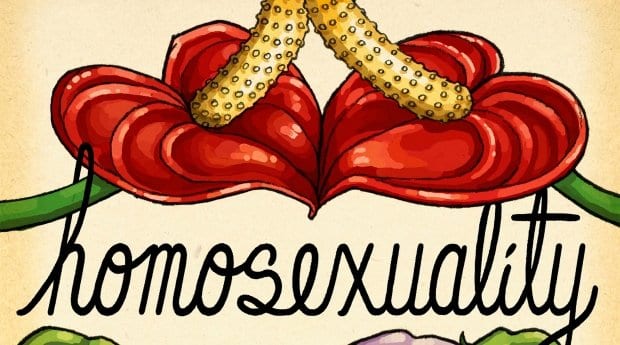Heterosexuality was invented by a queer person. You might find this fact uncomfortable, upsetting or hilarious, but it’s true. The concepts of the “heterosexual” and the “homosexual” were first used in a letter between two pioneering gay-rights activists that was written on May 6, 1868. The man who coined the terms, along with a few others for fornicators and masturbators that didn’t catch on, was Austrian-born Hungarian writer Karl-Maria Kertbeny.
Kertbeny wore a lot of hats: journalist, nationalist, literary champion, spy, botany enthusiast, legal reformist and, publicly, heterosexual. However, as Hungarian sociologist Judit Takacs writes in her essay “The Double Life of Kertbeny,” he was something of an unreliable narrator when it came to the official story of his life — especially where his sex life was concerned.
While he maintained an enthusiastic claim to his Hungarian heritage, and he was indeed the child of Hungarian parents, Kertbeny was born in Vienna on Feb 28, 1824. Christened Kertbeny Károly Mária at birth, he later changed his name to a more emphatically Hungarian form; as he began to travel, he met Hungarian writers and became their champion, at least in his mind. In his early 20s, he spent time attempting to translate the works of famous Hungarian contemporaries into German, but the venture was not favoured by Germans or Hungarians and largely failed. He travelled throughout Europe mostly penniless, writing where it could get him work and often ending up pawning his clothes for money. He briefly received funding from the Austrian secret police to start a subversive Hungarian culture journal, though he apparently didn’t take the work very seriously, as his police sources eventually dropped contact with him.
Whatever his successes or failures, Kertbeny should be forever remembered as the inventor of the term heterosexual. He first proposed the word in a letter to Karl Heinrich Ulrichs; they were both advocating for the repeal of Paragraph 143 of the Prussian penal code, which imprisoned men for “unnatural fornication.” (This was later adopted into the German criminal code as Paragraph 175, the law gay men were prosecuted under during the Holocaust.) Kertbeny published pamphlets anonymously that called for the emancipation of homosexualität (homosexuals), the first time the word appeared publicly.
Kertbeny claimed he was a “normally sexed individual” who accidentally stumbled onto the “existence of homosexualism and its slaves” because a friend had committed suicide after being blackmailed over his sexuality. Luckily, for posterity’s sake — maybe unluckily for Kertbeny and how he wanted to be remembered — he was an avid diarist. Takacs, who scoured Kertbeny’s personal journals from 1864 to 1881, found observations on the weather, his health, social commitments, legal disputes, money (or lack thereof), sexual encounters with men and the STIs he contracted.
Throughout his journal there are references to a young barber lad; another named János, whom he referred to affectionately as Jancsi; Lajos (or its diminutive Lajkó); Pali (or Palkó); and beautiful young waiters, among others. These entries include such references as “the barber would go but I didn’t want it,” “Lajos. Showed it whole. Beautiful,” “Lajko. Kissing” and “Lajkó has the clap. What will come of it?” Takacs notes that Kertbeny was extensively self-censoring, with names and entries abbreviated or crossed out — and with good reason, considering the air of fear and paranoia surrounding his dalliances. In an entry from Nov 1, 1866, Kertbeny wrote, “Jancsi played for me. Great fear that my neighbour, a lieutenant, noticed my morning games.”
His journals note that he followed the lawsuit against a theatre director named Feldtmann from Bremen, Germany. Feldtmann was arrested in October 1867 along with three 19-year-old men with whom, it was alleged, he’d practised “sexual crimes against nature.” In fact, one of the men had tried to blackmail Feldtmann before turning him in to the police. This or the long-term police harassment of fellow activist Ulrichs might have been what inspired Kertbeny to advocate for homosexual emancipation. (Takacs notes that Kertbeny had a habit of advocating for causes only when they directly affected him.)
While Kertbeny’s anonymous advocacy may have played a role, how did the term heterosexual become the monolithic monster it remains today? This, and other exciting developments, will be revealed in my next column on the not-so-straightforward history of heterosexuality.


 Why you can trust Xtra
Why you can trust Xtra


